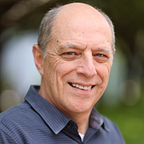What a Difference a Year Makes
How perspectives change from one birthday dinner to the next
When I stepped out to grab a cab, I heard music coming from Central Park. It was the Global Citizens Festival, a yearly event that coincides with Laura’s birthday. The sounds reminded me of last year’s birthday dinner. That evening, I had spent a few meditative moments on a park bench near the restaurant, the booming bass in the background, relieved her eighteen-week chemotherapy had just ended. We were about to begin a rejuvenation project to restore what she had lost — her energy, her confidence, her spunky spirit, and much more.
My wife’s cancer — and her health — dominated last year’s dinner conversation. We couldn’t let go of the intrusion lymphoma had inflicted on her life. We searched for ways to fight back, to help her repel the invasion. Her prescribed regiment had been brutal, physically and emotionally demanding. The physical woes were obvious: she lost weight, she was sickly pale, she was nauseous constantly, and most difficult for her, she was bald — her hair loss putting an end to my son’s silly jokes about his bald dad. Deeper, and mostly hidden, was the mental and emotional toll.
I came up with a fragility index to help us understand how capable, how ready, she felt about dealing with the minutiae, the routine, of any given day. It was a shortcut to allow a quick exchange of data without searching for words. Before her illness, she would have been at zero most days. During the chemo cycle, every third week she would hit a nine or a ten on the index. Five times I rushed her to the emergency room when she hit an eleven. On one of those occasions, she crashed so badly I discouraged her father from coming to see her in the ER until she recovered a bit. I was worried how her state would affect him. She could hardly move. Her eyes glazed and sunken. I knew she was still there, but it wasn’t easy to find the woman I met over a Fourth of July weekend many years ago. I was so smitten then that, before the weekend was over, I told a good friend I was going to marry her.
Hour after hour in that crowded ER she looked at me for respite that I couldn’t provide. It was a helpless feeling, but my stubborn optimism kept everything at a stalemate. I knew I would find her again.
Her oncologist’s unexpected appearance helped break the stalemate. He had been at a function nearby when he received my SOS earlier that evening. That we weren’t at his hospital didn’t seem to matter. If I had been praying for an angel to come help, that angel would have looked just like him: the young doctor from Israel, here on a fellowship. He assured me that Laura would be fine once the ER staff addressed her off-kilter blood counts. He was diplomatic with the ER staff who were surprised to find him at her side. He was firm on what needed to be done next. Sure enough, by morning, she had improved. Her father came to see her every night of her five-night hospital stay.
Fortunately, that ER visit turned out to be the low point of her adversity. After her last chemo treatment, we started on the rejuvenation project. Once she was cleared to travel, her best friend took her away for a pampered and restful few days near the beach, just the girls hanging in sweats at a hotel far from the city, away from the hospitals, the taxis, and everything else that was a reminder of her recent ordeal. Not initially obvious, was how much I also benefited from that break from the responsibility to look after her, to keep her hydrated and nourished, to keep track of her medicines.
I took her on short walks in the park, then longer walks, then short trips. We went out to restaurants after avoiding them for months — doctor’s orders to stay away from crowded places given her depleted immune system. We gathered with close friends, whose support we can never be grateful enough.
At this year’s dinner, my wife’s treatments and recovery didn’t come up once during the non-stop conversations. Not discussing chemotherapy, CT scans, or how real the wig looks felt like a return to normalcy. It felt like we had repelled the intrusion.
After dinner, I walked home with the youngsters who favored a stroll to aid the digestion. The music was still booming from Central Park, but the streets were tranquil. My kids and their cousins were chatting away, in their own world, leaving me alone with my thoughts. I thought about her doctors and nurses, who help so many people through difficult times; her sister’s prodigious ability to comfort; her father’s and his wife’s limitless support; and the many friends who rallied around us, some who went so far out of their way. I thought about the friends who drove four hours, arriving with all the ingredients necessary to cook meals for the upcoming week — a week when she was expected to be at her weakest — then drove back, all within twenty-four hours. Or her colleague who dropped off tons of halal food and a large bag of dates from Saudi Arabia — among the best, I was informed. They were such a treat, and soothing to her chemo-burned mouth. I will never eat another date without thinking about that bag. The kindness of so many dampened the upheaval. I felt a swell of gratitude towards all of them, knowing we had cleared a long, dark, and uncertain tunnel. Once again, I could look around and see clearly. Yes, what a difference a year makes.
This entry is a sequel to this post on P.S. I Love You:
For other essays on Medium.com, see https://medium.com/@matiz/essays-7c5f88cad2dc
